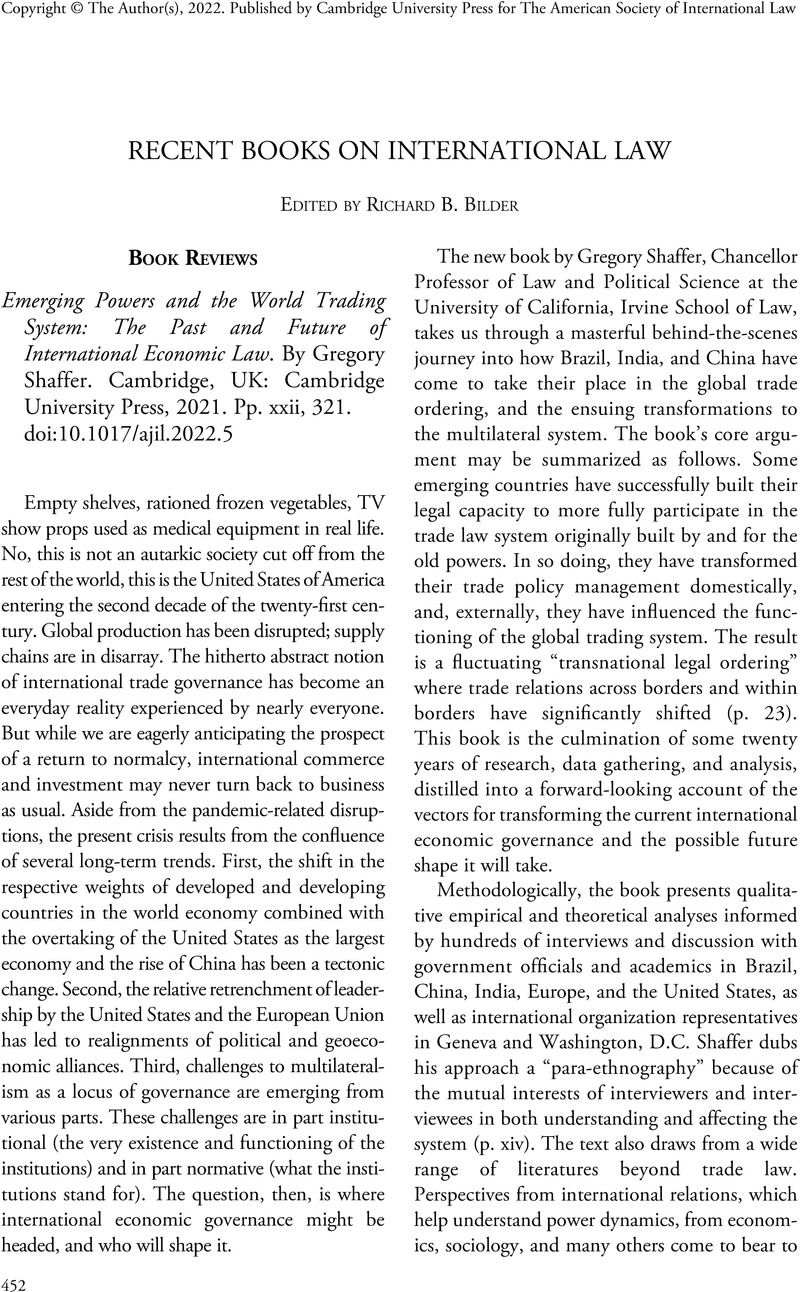Published online by Cambridge University Press: 22 April 2022

1 On the evolving practice of developing countries regarding dispute settlement at the WTO, see e.g., Dispute Settlement at the WTO—The Developing Country Experience (Gregory Shaffer & Ricardo Meléndez-Ortiz eds., 2010); Busch, Marc L., Reinhardt, Eric & Shaffer, Gregory, Does Legal Capacity Matter? A Survey of WTO Members, 8 World Trade Rev. 559 (2009)CrossRefGoogle Scholar; Shaffer, Gregory, Can WTO Technical Assistance and Capacity-Building Serve Developing Countries?, 23 Wisc. Int'l L.J. 643 (2006)Google Scholar. On the transformation of the legal profession in Brazil and India, see The Brazilian Legal Profession in the Age of Globalization: The Rise of the Corporate Legal Sector and Its Impact on Lawyers and Society (Luciana Gross Cunha, Daniela Monteiro Gabbay, José Garcez Ghirardi, David M. Trubek & David B. Wilkins eds., 2018); The Indian Legal Profession in the Age of Globalization: The Rise of the Corporate Legal Sector and Its Impact on Lawyers and Society (David B. Wilkins, Vikramaditya S. Khanna & David M. Trubek eds., 2017).
2 Philip C. Jessup, Transnational Law (1956). For a discussion of transnational law's progeny, see, e.g., The Many Lives of Transnational Law – Critical Engagement with Jessup's Bold Proposal (Peer Zumbasen ed., 2020).
3 Transnational Legal Orders of Criminal Justice (Gregory Shaffer & Ely Aaronson eds., 2020) (reviewed by Tom Ginsburg at 115 AJIL 772 (2021)); Transnational Legal Orders (Terence C. Halliday & Gregory Shaffer eds., 2015); Transnational Legal Ordering and State Change (Gregory Shaffer ed., 2013).
4 Shaffer, Gregory, Theorizing Transnational Legal Ordering, 12 Annual Rev. L. & Soc. Sci. 231 (2016)Google Scholar; Gregory Shaffer, Transnational Legal Ordering and Access to Medicines, in Patent Law in Global Perspective 97 (Ruth L. Okediji & Margo A. Bagley eds., 2014) (with Susan K. Sell); Shaffer, Gregory, Transnational Legal Process and State Change, 37 L. & Soc. Inquiry 229 (2012)Google Scholar; Bodansky, Daniel & Shaffer, Gregory, Transnationalism, Unilateralism and International Law, 1 Transnat'l Envtl. L. 31 (2012)Google Scholar; Shaffer, Gregory, A Transnational Take on Krisch's Pluralist Postnational Law, 23 Eur. J. Int'l L. 565 (2012)CrossRefGoogle Scholar; Gregory Shaffer, Michelle Ratton Sanchez Badin & Barbara Rosenberg, The Transnational Meets the National: The Construction of Trade Policy Networks in Brazil, in Lawyers and the Construction of Transnational Justice 170 (Yves Dezalay & Bryant G. Garth eds., 2012); Tom Ginsburg & Gregory Shaffer, How Does International Law Work?, in The Oxford Handbook of Empirical Legal Research 753 (Peter Cane & Herbert Kritzer eds., 2010) (arguing that “[u]nderstanding state behavior requires ‘unpacking’ the state and exploiting variation at the national and subnational level”); Nicolaidis, Kalypso & Shaffer, Gregory, Transnational Mutual Recognition Regimes: Governance Without Global Government 68 L. & Contemp. Probs. 263 (2006)Google Scholar.
5 Kristin Hopewell, Breaking the WTO: How Emerging Powers Disrupted the Neoliberal Project (2016). See also Sonia E. Rolland and David M. Trubek, Emerging Powers in the International Economic Order – Cooperation, Competition and Transformation 34–47 (2019) (discussing how developing countries have instrumentalized WTO rules and institutions for their policy objectives).
6 Panel Report, India – Certain Measures Relating to Solar Cells and Solar Modules, WT/DS456/R (Feb. 22, 2016), as modified by the Appellate Body Report, India – Certain Measures Relating to Solar Cells and Solar Modules, WT/DS456/AB/R (adopted Oct. 14, 2016).
7 Shaffer, Gregory C. & Gao, Henry, A New Chinese Economic Law Order?, 23 J. Int'l Econ. L. 607 (2020)CrossRefGoogle Scholar.
8 E.g., Trachtman, Joel P., The World Trading System, the International Legal System and Multilevel Choice, 12 Eur. J. Int'l L. 469, 470 (2006)Google Scholar; Trachtman, Joel P., Regulatory Jurisdiction and the WTO, 10 J. Int'l Econ. L. 631, 644 (2007)CrossRefGoogle Scholar.
9 Shaffer, Gregory, Retooling Trade Agreements for Social Inclusion, 2019 U. Ill. L. Rev. 1 (2019)Google Scholar.
10 See., e.g., Naoise McDonagh & Peter Draper, Industrial Subsidies, State-Owned Enterprises and WTO Reform: Prospects for Cooperation? (University of Adelaide Policy Brief, 2020), available at https://iit.adelaide.edu.au/ua/media/783/mcdonagh-draper-2020-industrial-subsidies-soes-and-wto-reform_0.pdf; Young-Shik Lee, Facilitating Development in the World Trading System—A Proposal for Development Facilitation Tariff and Development Facilitating Subsidy, 38 J. World Trade 935 (2004).
11 E.g., Cohen, Harlan Grant, What Is International Trade Law For? 113 AJIL 326 (2019)Google Scholar; Meyer, Timothy, Saving the Political Consensus in Favor of Free Trade, 70 Vand. L. Rev. 985, 1014–20 (2017)Google Scholar; Lamp, Nicolas, How Should We Think About the Winners and Losers from Globalization? Three Narratives and Their Implications for the Redesign of International Economic Agreements, 30 Eur. J. Int'l L. 1359 (2019)Google Scholar; Roberts, Anthea, Moraes, Henrique Choer & Ferguson, Victor, Toward a Geoeconomic Order in International Trade and Investment, 22 J. Int'l Econ. L. 655 (2019)Google Scholar; Arato, Julian, The Private Law Critique of International Investment Law, 113 AJIL 1 (2019)Google Scholar. These recent accounts build on a rich literature challenging legal-economic mantras about international economic law. See, e.g., Ruggie, John Gerard, International Regimes, Transactions, and Change: Embedded Liberalism in the Postwar Economic Order, 36 Int'l Org. 379 (1982)Google Scholar; Howse, Robert, From Politics to Technocracy—And Back Again: The Fate of the Multilateral Trading Regime, 96 AJIL 94 (2002)Google Scholar; Andrew Lang, World Trade Law After Neoliberalism: Reimagining the Global Economic Order (2011); Dani Rodrik, Straight Talk on Trade: Ideas for a Sane World Economy (2017).
12 HC Deb., Oct. 28, 1943, Vol. 393, cc403-73, 403, The Prime Minister (Mr. Churchill) (House of Commons Rebuilding), at https://api.parliament.uk/historic-hansard/commons/1943/oct/28/house-of-commons-rebuilding.